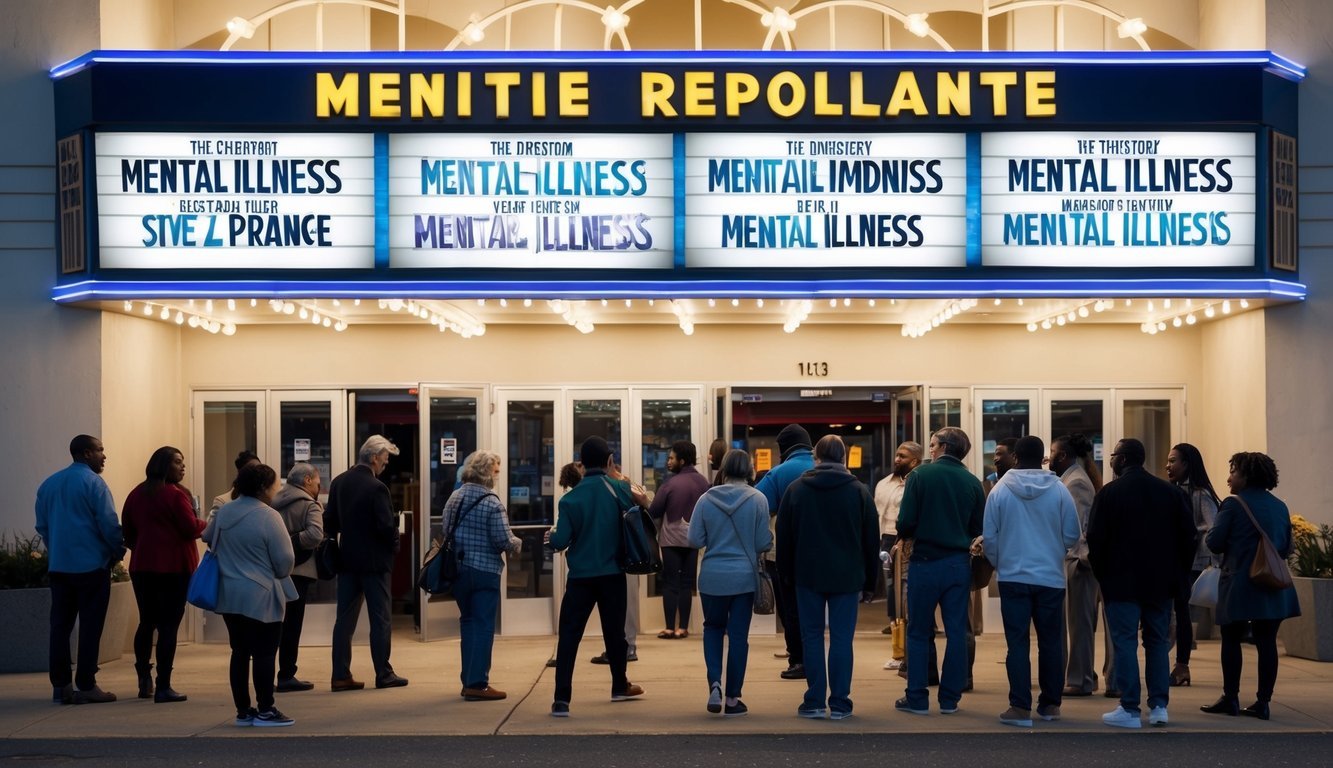PsychNewsDaily Publishers
100 Summit Drive
Burlington, MA, 01803
Telephone: (320) 349-2484
PsychNewsDaily Publishers
100 Summit Drive
Burlington, MA, 01803
Telephone: (320) 349-2484
Films focusing on mental illness often achieve commercial success, challenge stereotypes, and foster understanding, contributing positively to public perceptions of mental health issues.

Movies that focus on mental illness are more than just entertainment; they often resonate deeply with audiences. Studies show that films centered on mental health tend to earn more money, receive better reviews, and even win more awards than typical movies. This trend highlights a growing recognition and appreciation for the complexity of mental health issues in storytelling.
From powerful narratives to relatable characters, these films challenge stereotypes and foster understanding. Viewers are drawn to stories that depict real struggles and triumphs, making films about mental illness impactful and commercially successful.
As more filmmakers choose to shine a light on these themes, they not only tell captivating stories but also contribute to an important conversation about mental health.

The portrayal of mental illness in film has a significant impact on public perception. These films often highlight the struggles and realities faced by individuals with mental disorders, which can both educate and misinform audiences.
Movies often depict various mental health challenges, from depression to anxiety disorders. Films like A Beautiful Mind and Silver Linings Playbook show characters battling their internal struggles.
These portrayals can bring awareness to mental health issues, allowing viewers to empathize with those affected. They can clarify how mental health disorders impact daily life.
Yet, the accuracy of these portrayals varies. Some films present a realistic view, while others sensationalize or oversimplify complex issues. This inconsistency can confuse viewers about what living with a mental illness truly means.
Hollywood has a history of reinforcing stigmas around mental illness. Many movies use stereotypes, portraying characters as dangerous or unstable. This can lead to negative perceptions among the audience.
Stigmas often arise when mental illness is shown as something to fear. Characters are sometimes depicted as “other” or eccentric. Such portrayals can worsen existing prejudices.
Mental health awareness is critical in moving beyond these stereotypes. More films are being made that focus on realistic stories and positive representations. This shift encourages understanding and reduces stigma, allowing for better conversations about mental health.

Movies about mental illness not only entertain but also shed light on the experiences of those facing these challenges. They often dramatize real struggles and help shape how society views mental health.
Films like A Beautiful Mind and Silver Linings Playbook present powerful stories of individuals confronting their mental health issues.
A Beautiful Mind follows John Nash, a brilliant mathematician battling schizophrenia. This portrayal offers insight into how the disorder affects personal relationships and professional life.
Silver Linings Playbook showcases Pat, who deals with bipolar disorder. The film emphasizes recovery and connection, illustrating that mental health challenges can be managed with support.
Girl, Interrupted explores life in a mental health facility during the 1960s, shedding light on societal views of mental illness and the stigma surrounding it.
These films engage viewers by dramatizing the inner lives of characters, making their journeys relatable and impactful.
Iconic films have the power to change how people think about mental health.
The Perks of Being a Wallflower highlights the struggles of trauma and depression in adolescence. This resonated with many young viewers, helping to normalize conversations around mental health.
Still Alice brings attention to Alzheimer’s disease through the eyes of a young woman. This emotional portrayal raises awareness of cognitive decline and its impact on families.
These movies often lead to increased empathy and understanding in society. By telling unique and personal stories, they encourage discussions about mental health, reducing stigma and promoting acceptance.
Movies help create a more informed public, paving the way for better support and resources for those in need.

Movies often offer a glimpse into mental health issues, revealing the realities faced by many. Accurate representations are crucial in shaping viewers’ understanding and reducing stigma. This section explores the real faces of mental health disorders and how support and treatment are portrayed in film.
Portrayals of mental health disorders like depression, schizophrenia, and bipolar disorder can have a significant impact. In films such as Good Will Hunting and The King of Staten Island, characters struggle with their mental health journeys.
These representations can help viewers empathize with those who live with these challenges every day.
The way mental health treatment is shown in films can shape public perceptions. Many movies focus on therapy types and crises, but they can also miss key aspects of recovery.
Understanding these issues is vital for appreciating the complexities of mental health treatment shown in films.

Movies about mental illness have a significant impact on society. They shape how audiences view mental health and those who experience it. These films can foster acceptance and understanding while also stirring debate within the community.
Films like Beautiful Boy and Inside Out invite viewers to connect deeply with characters struggling with mental health issues. These stories allow audiences to explore complex emotions and the journey of acceptance.
Receiving critical acclaim, Aftersun also highlights themes of identity and mental health. This engagement creates a dialogue about real challenges. Viewers often reflect on their own experiences and consider how society perceives mental illness. Such narratives can reduce stigma and promote a sense of community for those affected.
The mental health community often reacts strongly to portrayals in film. While some films receive praise for their realistic depictions, others face criticism. For instance, movies like Dear Zindagi are lauded for their sensitive approach to therapy and personal growth.
However, inaccurate portrayals can reinforce harmful stereotypes. The community advocates for accurate representation, stressing the importance of empathy and understanding. Psychologists are now consulted more frequently to ensure responsible storytelling.
This effort is crucial in creating films that resonate positively and encourage acceptance.

This section provides answers to common questions about movies that explore mental health. It covers a range of films suitable for different audiences, including children and students, as well as documentaries on platforms like Netflix.
Some well-known movies that address mental health include A Beautiful Mind, Silver Linings Playbook, and Girl, Interrupted. These films offer insights into various mental health challenges and provide thoughtful portrayals of their characters.
Films like The Perks of Being a Wallflower and Dead Poets Society are great for students. They explore themes of depression, anxiety, and the importance of friendship in difficult times.
Inside Out is a popular animated film that represents emotions and mental well-being in a child-friendly way. Another option is A Monster Calls, which deals with grief and loss, suitable for older kids.
Netflix features several impactful documentaries on mental health. Heal and The Mind, Explained both explore how mental health affects different aspects of life and offer valuable insights.
Little Miss Sunshine and Prozac Nation showcase characters with mental health disorders in a relatable and compassionate way. These films highlight personal struggles while emphasizing the importance of support from family and friends.
Movies like The Virgin Suicides and One Flew Over the Cuckoo’s Nest provide deep emotional experiences. They address serious mental health issues and the impact of society on individuals dealing with these challenges.